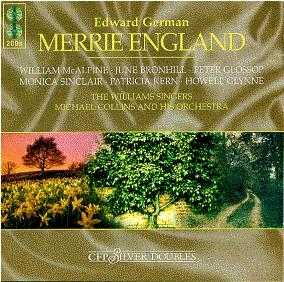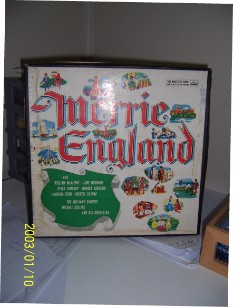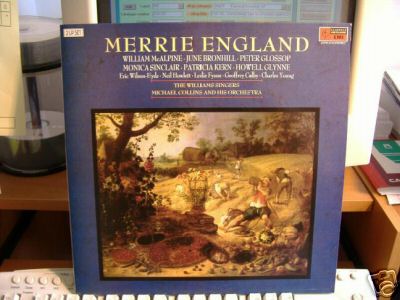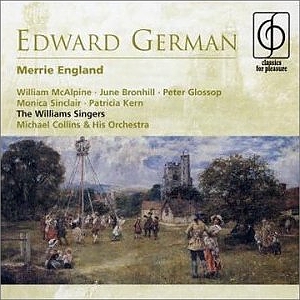The 1960 HMV Merrie England

Cast
Queen Elizabeth Monica Sinclair
The Earl of Essex Peter Glossop
Sir Walter Raleigh William McAlpine
Bessie Throckmorton June Bronhill
Jill-all-alone Patricia Kern
Kate June Bronhill
with Howell Glynne, Eric Wilson-Hyde, Neil Howlett, Leslie Fyson, Geoffrey Colby, and Charles Young
The Williams Singers
Michael Collins and his Orchestra
This was the first (almost) musically complete recording of Merrie England to be issued since HMV's own near-complete recording of 1918 conducted by the composer, Edward German himself. Although the album's release in October of 1960 coincided with, (and was no doubt, inspired by), a revival of Merrie England staged by the Sadler's Wells Opera Company from 10th August 1960 (and featured many singers who had performed with the company), the recording was based on the score of the original 1902 production and not the revised score used by Sadlers' Wells. Of the soloists, only Patricia Kern had appeared in the Sadler's Wells production as Jill-All-Alone.
The contents of the double album are listed as follows:
ACT 1
1. Overture (Michael Collins and his Orchestra); Opening Chorus (The Williams Singers)
2. We are two proper men (Eric Wilson-Hyde & Neil Howlett)
3. Oh! Where the deer do lie (Patricia Kern & Chorus)
4. I do counsel that your playtime (Howell Glynne & Chorus)
5. That every Jack should have a Jill (William McAlpine & Chorus)
6. Love is meant to make us glad (June Bronhill, Patricia Kern, William McAlpine, Howell Glynne & Neil Howlett)
7. She had a letter from her love (June Bronhill)
8. When true love hath found a man (June Bronhill & William McAlpine)
9. When a man is a lover (Peter Glossop, Eric Wilson-Hyde & Leslie Fyson)
10. The Yeomen of England (Peter Glossop & Chorus)
11. Entrance of Queen Elizabeth and "God save Elizabeth" into "O peaceful England" (The Williams Singers, Monica Sinclair & Chorus)
12. King Neptune sat on his lonely throne (Howell Glynne & Chorus)
13. Finale (Monica Sinclair, Patricia Kern, June Bronhill, William McAlpine, Peter Glossop & The Williams Singers)
ACT II
1. The month of May has come today (Patricia Kern & Chorus)
2. In England, Merrie England (June Bronhill, Patricia Kern, Howell Glynne & Geoffrey Colby)
3. The big brass band (Howell Glynne, Charles Young & Chorus)
4. It is the merry month of May (Patricia Kern & William McAlpine)
5. The Queen of May is crowned today (The Williams Singers); Rustic Dance (Michael Collins and his Orchestra)
6. Dan Cupid hath a garden (William McAlpine)
7. Two merry men a-drinking (Howell Glynne, William McAlpine, Neil Howlett & Chorus)
8. Who shall say that love is cruel? (June Bronhill)
9. When Cupid first this old world trod (Peter Glossop, June Bronhill, Patricia Kern & William McAlpine)
10. Oh! Here's a to-do to die to-day (Leslie Fyson & Chorus)
11. Finale (Full company)
The song "The big brass band" was added during the show's original 1902 production and was not published in the 1902 edition of the vocal score by Chappell & Co., but was interpolated into later editions. It was not recorded by Edward German for the 1918 HMV set of Merrie England which, however, did include "The sun in the heaven is high," a trio with male chorus for Simkins, the Tailor and the Butcher (immediately following the quartet "In England, Merrie England" in the score) which was omitted from the 1960 HMV recording. However neither recording included the numbers "Perhaps you don't imagine," sung by Wilkins and the "Egyptian Dance" in the Masque of St. George and the Dragon, which both follow Essex's song "When Cupid first this old world trod" in the second Act.
The allocation of songs amongst the supporting cast of singers is not always consistent with regard to the stage characters portrayed — Walter Wilkins is sung by both Howell Glynne, (in "I do counsel that your playtime," the quintet "Love is meant to make us glad," "King Neptune sat on his lonely throne," "The big brass band," and the trio with chorus "Two merry men a-drinking") and Leslie Fyson, (in "When a man is a lover" and "Oh! Here's a to-do to die to-day"); Silas Simpkins is sung by both Eric Wilson-Hyde, (in "When a man is a lover") and Charles Young, (in "The big brass band"); the Royal foresters Long Tom and Big Ben are sung by Eric Wilson-Hyde and Neil Howlett (in the duet "We are two proper men"), and by Howell Glynne and Geoffrey Colby, (in the quartet "In England, Merrie England"), while the vocal line of Long Tom is sung by Eric Wilson-Hyde in the Act I finale and by Neil Howlett in the quintet "Love is meant to make us glad," (with June Bronhill as Kate and Patricia Kern as the May Queen), and the trio "Two merry men a-drinking."
Following the album's release in October of 1960, HMV released two 45rpm, 7" EPs containing highlights from the complete recording around December of 1961 and January of 1962 respectively, in both mono and stereo versions. The first EP1 (1961) contained the selection: "That every Jack should have a Jill" and "She had a letter from her love" on Side 1 and "Oh! Where the deer do lie" and "The Yeomen of England" on Side 2. The second EP2 (1962) contained "Entrance of Queen Elizabeth" and "God save Elizabeth" into "O peaceful England" on Side 1, and "Love is meant to make us glad" and "In England, Merrie England" on Side 2.
Until Merrie England is re-recorded in the future, this remains the definitive (and virtually, only available), recording of the score. It has been reissued many times since its first release in 1960.
Scott Farrell has this to say about the recording:
Although the orchestra is first-rate (a sharp contrast to the 1976 Stockwell College recording) and the singing is quite good, the recording is not my favourite of the many available Merrie Englands. Besides the numerous cuts in the second act, I am dismayed by the choice of Kern as Jill. I find her voice too heavy for the role, and her songs are just dragged down by this. Her first solo is a great example of this, for the tempo is clearly not "Allegro Vivace". I also find several of the tempi too eccentric, too fast. The cast inconsistencies aside, it is a fine recording but not my first choice if I want to listen to the opera (or selections from it).
Issue History
1960 HMV Mono LP CLP 1376-7
Stereo LP CSD 1311-2
1961 HMV Mono EP1 7EG 8698
Stereo EP1 GES 5834
1962 HMV Mono EP2 7EG 8712
Stereo EP2 GES 5842
1976 EMI Double-Up Stereo LP DUO121
ca. 1980 World Record Club
(Australia) Stereo LP W.R.C. S/?????
1988 EMI Classics for Pleasure Stereo LP CFPD 4710
Stereo Cassette TC-CFPD 4710
1989 EMI Classics for Pleasure Stereo CD CD-CFPD 4710
1995 EMI Classics for Pleasure
(CFP 'Silver Doubles') Stereo CD CD-CFPSD 4796
2002 EMI Classics for Pleasure CD 7243 5 75767 2 7
Contributed by Robert Morrison


